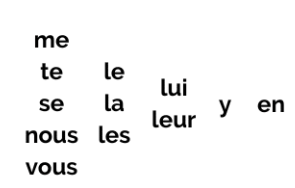Pronouns
1/10
Earn XP
Description and Tags
Pronouns and what exactly they mean
Name | Mastery | Learn | Test | Matching | Spaced |
|---|
No study sessions yet.
11 Terms
Qui
Replaces subject nouns (je, tu, etc.) when already mentioned.
Can also mean “who”,
e.g I need the person who can help me —> J'ai besoin de la personne qui peut m'aider
Que
Like qui, but pronoun is the object,
e.g I like the things that I know —> J’aime les choses que je connais.
Dont
Similar to que, but only when the object is preceded by “de” , like “en”.
me/te/le/la/nous/vous/les
Direct object pronouns that go before verbs,
e.g I like it —> Je l’aime
me/te/lui/nous/vous/leur
Indirect object pronouns that go before verbs, typically translated as ‘to’ or ‘from’
e.g I speak to him —> Je lui parle
Y/en
Y: when the object has the preposition à. Also used for a place
En: same thing but with “de”
E.g I’m going there —> J’y vais
I’m speaking about it to him —> Je lui en parle.
Order of verb pronouns

lequel/laquelle/lesquels/lesquelles
Quich ones,
e.g Of the watches, which ones do you like —> Parmi les montres, lesquelles préférez-vous?
Ce qui et ce que
When the object isn’t introduced:
E.g I know what I like —> Je sais ce que j’aime
E.g I know what works —> Je said ce qui fonctionne
Celui/Celle/Ceux/Celles
Pronoun for an object, translates to “the ones” or “the one”
-ci, -là
Adding -ci to Celui/Celle/Ceux/Celles indicates close proximity, whereas -là is generally further away. Roughly translates to this/that/these/those
E.g Of the watches, I hate those ones —> Parmi les montres, je déteste celles-là
E.g Of the watches, I hate this one —> Parmi les montres, je déteste celle-ci